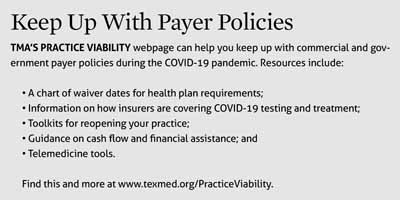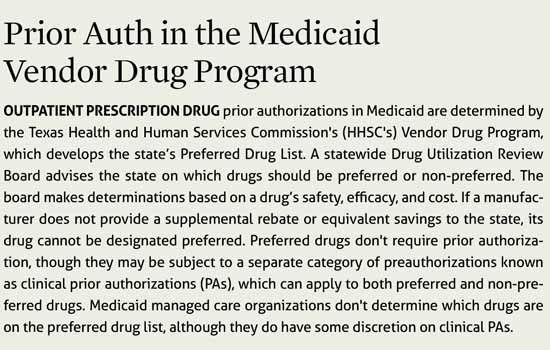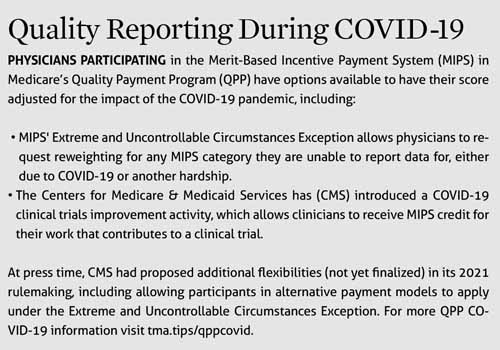
Amid the chaos of COVID-19, physician practices have scrambled to adapt to new and evolving policies from health plans, which are adapting as well. As they do, Texas doctors are finding a mixed bag of rules and regulations that on one hand present patient safety concerns, care delays, and cost-shifting, but also have offered flexibility in some cases, recognizing the extraordinary circumstances of 2020.
“There are some policies they’re pushing forward that are not in the best interest of patients, and then there are some policies that are incredibly helpful to patient care,” said Austin oncologist, Debra Patt, MD, chair of the Texas Medical Association’s Council on Legislation, and president-elect of the Texas Society of Clinical Oncology. “They are making a lot of changes to help patients, but also taking this as an opportunity to forward initiatives that they have been interested in for many years that have had little traction.”
As Texas heads into a legislative session in January, TMA is keeping tabs on payer behavior, the good and the bad.
Dr. Patt has collected accounts from practices throughout the state about questionable health plan policies related to cancer treatment and medication access, and ongoing hassles with prior authorization.
“During the coronavirus pandemic, when hospitals and doctors’ offices are preoccupied with managing new safety concerns, it is an easier landscape for insurance companies to push these policies without resistance,” she said.
However, Dr. Patt and other physicians note health plans are also helping physicians through expanded telemedicine coverage, relaxed requirements for hitting quality metrics in value-based care contracts, and earlier drug refills, for instance.
“Being able to quickly ramp up telemedicine services for patients in their homes and have the services reimbursed by commercial insurance has been a powerful way that insurance companies have acted to enable doctors to reduce risk in their clinics and provide meaningful patient care,” she said.
Treatment complications
For Dr. Patt, home infusion for chemotherapy is the most troublesome payer policy she’s seen thus far, citing the promotion of it by Optum Health, which is owned by UnitedHealth.
While it’s not impossible to deliver chemotherapy at home, it’s not the safest setting for it, she says, likening it to home birth.
“Because [infusion] is always supervised by a physician on site who has the capability to observe the patients and manage them appropriately, adverse events are managed and patients can safely receive therapy. We are there to assess and treat,” Dr. Patt explained. “If a patient is treated in their home, we don’t have the opportunity to manage and treat and mitigate the adverse drug reactions we commonly see.”
Optum Health didn’t respond to Texas Medicine’s requests for comment.
Other questionable tactics that have gained greater popularity under COVID-19 include two types of drug “bagging” arrangements, Dr. Patt says. “White-bagging” occurs when health plans require physicians or facilities to purchase medications through specialty pharmacies. For insurers, it’s a more cost-controlling, utilization-regulating alternative to the normal routine of practices purchasing the drugs directly, then billing payers for the treatment.
Dr. Patt says white-bagging creates dosing concerns for treatments like chemotherapy, because doses may have to be changed based on a patient’s status at the time of their visit. As a result, purchasing the drug from a health plan’s specialty pharmacy, instead of oncologists purchasing it themselves, leads to dosing accuracy and inventory issues.
Then there are “brown-bagging” mandates, in which health plans require that patients receive drugs at home from the pharmacy, then bring them to the physician’s office for administration.
For cancer treatment, Dr. Patt says, it’s a “ludicrous” policy.
“These drugs that we give, these biologics, they’re expensive and require special handling and storage temperatures. If the handling and storage temperature is not right, it could impact the effectiveness of the therapy,” she said. “We don’t allow it at all. You would never let someone bring in a drug that was mailed to their home, possibly sat out in the 100-degree heat on their front porch for an afternoon and then brought in clinic, for us to use in our cancer center.”
One health plan Dr. Patt says had been particularly aggressive about white-bagging, Cigna, did not respond to interview requests.
Blue Cross Blue Shield of Tennessee (BCBST), which began a white-bagging policy at the start of 2020, insures a number of her patients who work at a Dallas auto plant. In a statement to Texas Medicine, BCBST spokesman John Hawbaker said employers had been asking the insurer for several years for cost management on expensive “provider-administered specialty drugs.”
BCBST contracts and sets rates directly with its specialty pharmacies and has performance guarantees in its contract to make sure pharmacies package and ship the drugs appropriately to practitioners, Mr. Hawbaker says. BCBST estimates the program will generate 20% savings on those specialty drugs.
“We recognize some providers have concerns about waste related to dosing – but waste exists in the ‘buy and bill’ system already. And we don’t think our program will substantially increase waste,” Mr. Hawbaker told Texas Medicine in the statement.

Drug access made difficult
Meanwhile, so-called “copay accumulator” programs are raising physicians’ eyebrows. One such change by Blue Cross Blue Shield of Texas (BCBSTX) on drug manufacturer coupon cards for 2020 started at the beginning of the year.
But Dallas public health physician John Carlo, MD, says if not for the pandemic, “we would’ve had more of a fight about this.”
Under the 2020 BCBSTX change, patients no longer can apply drug manufacturer coupons to their deductible or out-of-pocket maximum.
The attempt at cost-control wasn’t welcome at Dr. Carlo’s HIV/AIDS clinic, Prism Health North Texas.
“That’s definitely been noticed and [is] a big deal for us, particularly for a patient with a high-deductible plan. Without the copay card counting towards that deductible, basically, what happens is the health plan wins and the patient loses a tremendous amount,” he said. “If you look at an HIV medication regimen, which can cost up to about $2,500 a month, sometimes even up to $3,000 a month, that first bill in January, the copay cards will usually cover that; in fact they’ll go up to maybe about $6,000. So [previously] you might get through two-and-a-half months of using the copay card and then not paying anything out of pocket.”
BCBSTX declined comment for this story.
Lubbock pediatrician Celeste Caballero, MD, hoped COVID-19 would prompt Medicaid to relax some of the prior authorization requirements she’s increasingly and “randomly” dealt with the past four to five years, namely for established and inexpensive medications like ADHD drugs, NSAIDs, and antibiotics.
Unfortunately, that hasn’t happened.
Especially during such a trying environment, “I was shocked that we were still getting a steady stream of prior authorizations from Medicaid on medications that are old, cheap, and medications that certain patients had been on before. It just doesn’t make sense,” Dr. Caballero said. “For example, ADHD medications like Ritalin – short-acting Ritalin. That’s an old medication, cheap, should not be expensive for these insurance companies to pay for, and they are giving me a hard time about that prescription during COVID.”
When she transitioned from private practice to an urgent-care facility in July, she went from an environment where preauthorizations were a bear to one where they were considered simply undoable.
The day after prescribing Bactrim to a child with a urinary tract infection, Dr. Caballero found out the patient could not get the oral antibiotic because the child’s Medicaid plan through Superior Health required prior authorization. (See “Prior Auth in the Medicaid Vendor Drug program,” right.) Her nurse informed her the urgent care clinic did not pursue any prior authorizations because of lack of time. With no other option, Dr. Caballero quickly entered a prescription for another antibiotic.

“Because my nursing staff and I were too overwhelmed with COVID-exposed patients lining up at our front door, we were unable to call the family to relay the change in antibiotic the next day,” said Dr. Caballero, who could do nothing but hope that the pharmacy would notify the child’s family about the switch.
Superior Health Plan responded to Texas Medicine’s interview request by email, saying it covers prescriptions listed in the Vendor Drug Program and formulary. Bactrim, it noted, is not one of them.
“Therefore, Bactrim would be subject to prior authorization from the state which we would attempt to obtain on behalf of the prescriber,” Superior said. “Per the state’s formulary, Superior covers several generic forms of Bactrim without requiring a prior authorization. In the general course of business, a pharmacy will contact a prescriber and offer to switch to the generic so no prior authorization would be needed.”
HHSC acknowledged an interview request but did not comment by press time.
Dr. Caballero says doctors shouldn’t have another obstacle placed in front of them as they slog through the extra stressors COVID-19 creates.
“I just feel like the payers are not acknowledging the context of the time; the fact that we are dealing with difficulties in logistics with staff [and] telemedicine,” she said. “We’re dealing with some clinics [that] are on reduced staff due to furloughs. … Payers are just not honoring and acknowledging what we’re in the middle of. I think they are kind of taking advantage of that.”
Steps in the right direction
Some payers, on the other hand, have responded to COVID with policy shifts that make life easier for physicians and patients.
Dr. Patt notes several flexibilities health plans implemented during the pandemic, including:
• Rapid expansion of telemedicine coverage;
• Waived copays for COVID-19 testing and COVID-related visits;
• Coverage of prescription refills sooner so patients can have a larger supply on hand;
• Coverage of expanded mental health services; and
• Extensions of prior authorization periods for surgeries that were delayed due to the state’s temporary suspension of procedures that weren’t immediately medically necessary.
Telemedicine coverage, Dr. Patt says, has been the most meaningful step to allow patients to receive needed care and reduce the risk of spreading COVID-19.
State-regulated plans and Medicare faced temporary mandates to expand telemedicine coverage and payments, while most ERISA-regulated commercial plans did not, although “largely they have had comprehensive coverage of telemedicine during the pandemic,” she said.
Dr. Carlo adds some health plans have been more lenient about allowing longer-term prescriptions for HIV medications for routine, ongoing use. Those types of HIV drugs typically are dispensed for no more than 30 days, Dr. Carlo says. Health plans also have been permitting patients to get refills sooner on those drugs.
“We certainly hope it continues, because honestly that’s a huge benefit for people just not having to make another trip to the pharmacy or going into planning ahead and using mail-order service, for example.”
And when it comes to quality programs, most commercial payers have shown understanding of the difficulties in hitting benchmarks that accountable care organizations (ACOs) must achieve to earn savings or bonuses in their value-based care contracts, says Kim Harmon, vice president of ACO services for TMA PracticeEdge.
“I would say that almost all commercial contracts have [relaxed] their quality measures for 2020,” she said.
For example, PracticeEdge ACOs participating in a BCBSTX shared savings program must hit 75% of their quality metrics to keep the maximum 50% of the savings they generate. BCBSTX is starting them off with a minimum score that guarantees those ACOs will keep at least 25% of the savings they help create.
Cigna and Aetna, Ms. Harmon said, are requiring reporting of their measures for 2020, but won’t penalize participants for falling short.
Meanwhile, Medicare is offering potential help in some if its quality reporting requirements for participating physicians. (See “Quality Reporting During COVID-19,” below.)

A priority for medicine
Questionable payer behavior during COVID is already on TMA’s advocacy radar, Dr. Patt said. But she notes that seeking sweeping changes in insurance policy is complex because of the split in the market between state-regulated plans – which cover about 16% of Texans – and federal plans – which cover the rest of the state’s insured.
TMA made progress on prior authorizations during the 2019 session of the Texas Legislature and likely will follow up during the next session in 2021.
TMA lobbyist Clayton Stewart says insurer practices hindering patient care that aren’t already prohibited may require legislative attention to ensure timely access to care.
“Prior authorization and utilization review reforms remain a significant priority for physicians,” Mr. Stewart said. “Anything that is a barrier to the patient-physician relationship, let alone a catalyst for a poor patient outcome – whether COVID-19-related or not – needs to be fixed.”
Certainly, physicians will look during next year’s session to make permanent the positive steps that the pandemic ushered in in the telemedicine realm, Dr. Patt says. “We need for there to be a legislative initiative moving forward to allow telemedicine to continue to be meaningful,” she said.
Tex Med. 2020;116(10):26-31
October 2020 Texas Medicine Contents
Texas Medicine Main Page